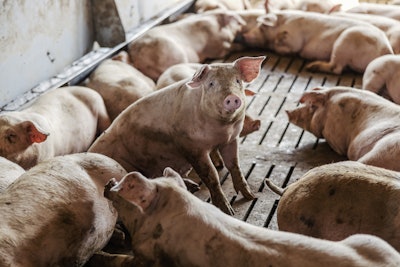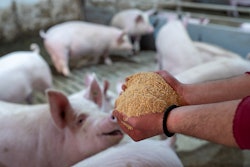
In Germany’s most northeastern state, consistent engagement by a range of stakeholders has been credited with progress in gaining control over African swine fever (ASF). However, the state minister has warned that continued efforts will be required for at least another 12 months before all restrictions can be lifted there.
While the number of ASF-infected wild boar found in Germany continues to rise, there are signs that concerted efforts have been effective in bringing the disease situation in one state under control.
With the epidemic now described as stable in the northeastern state of Mecklenburg-West Pomerania, the area with restrictions on hunting, farming and forestry in the district has been greatly reduced. With approval from the European Union, the state government reports, the restricted area now covers 30,000 hectares of Ludwigslust-Parchim. This is just one-quarter of the previous area.
Mecklenburg-West Pomerania is the first German state to have succeeded in controlling the spread of ASF in wild boar, according to the agriculture minister, Dr. Till Backhaus. This was achieved through the cooperation of a range of parties in the state, he said. Costs reached EUR17 million (US$18.3 million) for fencing, hunters’ rewards, and the training of dogs to find wild boar carcasses.
Despite this progress, the minister urged continuing biosecurity and hygiene measures as the ASF virus can remain viable for a long time in the environment.
Backhaus expressed cautious optimism that all restrictions could be lifted across Mecklenburg-West Pomerania in another 12 months.
According to official reports to the World Organisation for Animal Health (WOAH), the first wild boar tested positive for the ASF virus in this state in November 2021. This was followed by other outbreaks — all in Ludwigslust-Parchim district — until the most recent case in August 2022. One outbreak was also confirmed on a commercial pig farm.
Since ASF virus was first detected in Germany in September 2020, virus-positive cases in the country’s wild boar have reached 5,356. This is according to the national veterinary agency — the Friedrich-Loeffler Institute (FLI), and it includes 57 cases confirmed over the previous 28 days. Cases in the wild population have been confirmed in three of Germany’s eastern states.
3 European states report new ASF cases in domestic pigs
So far in 2023, the total number of confirmed ASF outbreaks on farms and in backyard herds is at 193. Covering EU member states and immediate neighbors, this is according to the Animal Disease Information System of the European Commission (EC; as of June 3).
Registering the most outbreaks in this category so far is Serbia with 86 so far this year. Next comes Romania with a total of 82 since the start of January, and Moldova with 15.
Between one and three outbreaks in domestic pigs have also been recorded through this system by Germany, Greece, Italy, Poland and Ukraine.
Over the previous two weeks, only Italy and Romania reported further outbreaks in domestic pigs through the EC System — increases of one and six outbreaks, respectively.
Further details of these events are provided in the official notifications to WOAH from the national veterinary authorities.
In Romania, the four most recently reported outbreaks were in small backyards herds comprising a total of 11 pigs.
The second ASF outbreak in the Italian region of Calabria involved 53 animals at a premises described as a “farm.”
Furthermore, the authorities in Greece have confirmed to WOAH a third ASF outbreak in domestic swine since January. With 147 pigs — two of which died — the affected premises was located near to previous outbreaks in the north of the Central Macedonia region.
ASF outbreaks in European wild boar passes 4,500
Already this year, the total number of ASF outbreaks across Europe has reached 4,553, according to EC’s information system (up to June 3). This the latest total from 16 countries registering one or more outbreaks through this system since January 1. Since the EC’s previous update dated May 19, 10 states have reported new cases in this population.
Registering the highest number of outbreaks in this category so far this year is Poland with a total of 1,737. Following are Germany (now with 645), Italy (558), Slovakia (430), Hungary (294), and Romania (210).
Also reporting new ASF outbreaks to the EC System since the previous update were the Czech Republic (Czechia), Estonia, Latvia and Lithuania.
In 2022, there were a total of 7,442 outbreaks of ASF in wild boar in 15 European countries covered by the EC System.
In addition, North Macedonia’s animal health agency has reported one more cases of ASF in a wild boar to WOAH. This brings the nation’s total since December 2021 to 78.
Since ASF returned to the Czech Republic at the end of 2022, 28 wild boar have tested positive for the virus, according to the state veterinary service. All of these cases have been found in one of two districts in the northern region of Liberec.
By the end of May, the ASF virus had been detected in five regions of Italy so far this year - mainly in wild boar. Furthermore, the virus has been circulating on the Italian island of Sardinia for decades, according to RAI News.
More ASF cases in Volga region in western Russia
While the EC System does not cover the disease situation in Russia, the nation’s veterinary authorities report disease developments to WOAH.
In the Volga federal district, presence of the ASF virus was confirmed after 120 pigs died at a farm in the Saratov region in mid-May. Out of the original herd of almost 8,000 animals, 280 were culled to prevent further spread of the disease.
Based on the official report, this outbreak was within around 20 kilometers of a previous outbreak in a wild boar in the same region two months earlier.
After a seven-month hiatus, the ASF virus has been detected again in Ulyanovsk, a region in the same federal district.
At the start of May, one wild boar in the Surskiy district tested positive for the virus. Subsequently, infection was confirmed in two herds of backyard pigs in the same district. Affected were a total of 228 domestic swine.
For the first time since November 2022, an infected wild boar has been reported in Nizhny Novgorod. According to the WOAH notification, it was found dead in this region — also in the Volga federal district — at the end of May.
In contrast, the Russian authority has recently declared to WOAH that the ASF situation has been “resolved” in six regions.
This applies to Kostroma, Oryol and Yaroslavl in the Central federal district, to Samara in the Volga district, to Kaliningrad in the Northwestern district, and to Stavropol in in the North Caucasian federal district.
View our continuing coverage of the global African swine fever situation.



![Fs africa Middle East Mideast Map Scaled E1615245867823[1]](https://img.feedstrategy.com/files/base/wattglobalmedia/all/image/2023/05/fs.africa_middle_east_mideast_map_scaled_e1615245867823_1_.6477715f16eeb.png?auto=format%2Ccompress&fit=crop&h=167&q=70&w=250)












